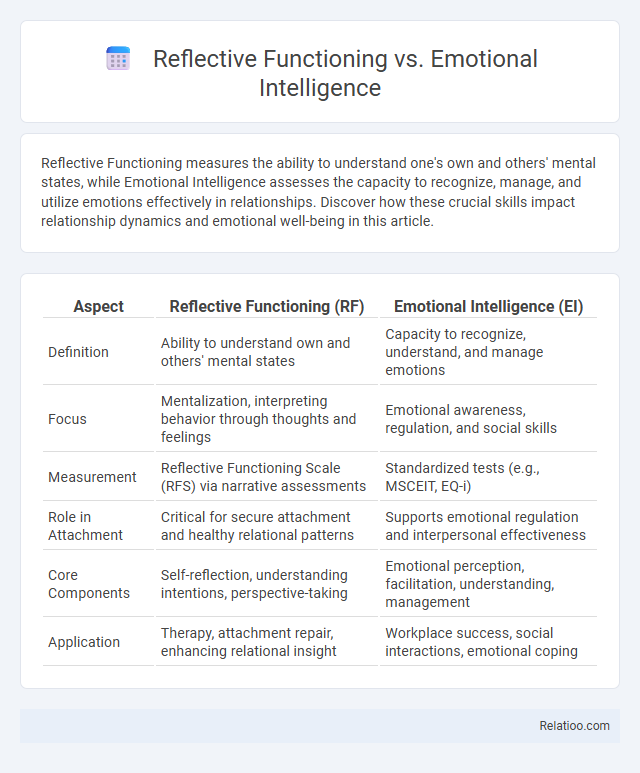Reflective Functioning measures the ability to understand one's own and others' mental states, while Emotional Intelligence assesses the capacity to recognize, manage, and utilize emotions effectively in relationships. Discover how these crucial skills impact relationship dynamics and emotional well-being in this article.
Table of Comparison
| Aspect | Reflective Functioning (RF) | Emotional Intelligence (EI) |
|---|---|---|
| Definition | Ability to understand own and others' mental states | Capacity to recognize, understand, and manage emotions |
| Focus | Mentalization, interpreting behavior through thoughts and feelings | Emotional awareness, regulation, and social skills |
| Measurement | Reflective Functioning Scale (RFS) via narrative assessments | Standardized tests (e.g., MSCEIT, EQ-i) |
| Role in Attachment | Critical for secure attachment and healthy relational patterns | Supports emotional regulation and interpersonal effectiveness |
| Core Components | Self-reflection, understanding intentions, perspective-taking | Emotional perception, facilitation, understanding, management |
| Application | Therapy, attachment repair, enhancing relational insight | Workplace success, social interactions, emotional coping |
Introduction to Reflective Functioning and Emotional Intelligence
Reflective Functioning refers to the capacity to understand one's own and others' mental states, such as beliefs, desires, and emotions, enabling better interpersonal relationships and self-awareness. Emotional Intelligence involves the ability to recognize, interpret, and manage emotions effectively in oneself and others, facilitating social competence and emotional regulation. Both constructs are essential for psychological resilience and social functioning, with Reflective Functioning emphasizing mentalization processes and Emotional Intelligence focusing on emotion processing and management skills.
Defining Reflective Functioning
Reflective functioning is the capacity to understand and interpret your own and others' mental states, such as thoughts, feelings, and intentions, which provides a foundation for secure relationships and emotional regulation. Emotional intelligence encompasses a broader skill set, including recognizing emotions, managing feelings, and navigating social interactions effectively, while reflective functioning specifically emphasizes mentalization and insight into the mind's inner workings. Developing reflective functioning enhances your ability to empathize deeply and respond adaptively to emotional experiences.
Understanding Emotional Intelligence
Understanding Emotional Intelligence involves recognizing and managing your emotions effectively while also perceiving and influencing the emotions of others. Reflective Functioning, often linked with mentalization, emphasizes your ability to understand the mental states behind behaviors, which enhances empathy and interpersonal relationships. While Emotional Intelligence drives emotional awareness and regulation, Reflective Functioning deepens the insight into why emotions arise, complementing your overall emotional and social skills.
Key Differences Between Reflective Functioning and Emotional Intelligence
Reflective functioning refers to the ability to understand and interpret your own and others' mental states, such as thoughts and feelings, whereas emotional intelligence emphasizes recognizing, managing, and utilizing emotions effectively. Key differences lie in reflective functioning's focus on mentalization and self-other understanding, while emotional intelligence centers on emotional regulation and interpersonal skills. Your development in reflective functioning enhances empathy and social cognition, complementing emotional intelligence's practical application in emotional awareness and relationship management.
The Role of Reflective Functioning in Mental Health
Reflective Functioning refers to the ability to understand one's own and others' mental states, playing a crucial role in mental health by enhancing emotional regulation and interpersonal relationships. Emotional Intelligence involves recognizing, understanding, and managing emotions, while Reflective Functioning emphasizes interpreting mental states behind behaviors to foster empathy and resilience. High Reflective Functioning is linked to reduced symptoms of depression and anxiety, improving psychological well-being through better mentalization and self-awareness.
Emotional Intelligence: Impact on Relationships and Work
Emotional Intelligence significantly influences your ability to navigate social complexities, improve communication, and foster empathy in both relationships and work environments. Unlike Reflective Functioning, which centers on understanding mental states in oneself and others, Emotional Intelligence encompasses recognizing, managing, and utilizing emotions to achieve positive interpersonal outcomes. Enhancing Emotional Intelligence can lead to stronger teamwork, conflict resolution, and deeper emotional connections, ultimately boosting personal and professional success.
Measuring Reflective Functioning: Tools and Methods
Measuring reflective functioning involves assessing an individual's ability to understand their own and others' mental states using tools like the Reflective Functioning Scale (RFS) applied to the Adult Attachment Interview or the Parent Development Interview. Emotional intelligence is typically measured through self-report questionnaires like the Mayer-Salovey-Caruso Emotional Intelligence Test (MSCEIT), which evaluates skills in perceiving, using, understanding, and managing emotions. Your capacity to improve interpersonal relationships can be better supported by focusing on reflective functioning assessments, which provide deeper insights into mentalization processes beyond traditional emotional intelligence measures.
Assessing Emotional Intelligence: Common Frameworks
Assessing emotional intelligence often involves frameworks such as the Mayer-Salovey-Caruso Emotional Intelligence Test (MSCEIT) and the Emotional Quotient Inventory (EQ-i), which measure abilities like emotion perception, understanding, and regulation. Reflective functioning, distinct from emotional intelligence, centers on your capacity to understand the mental states behind behavior, assessed through tools like the Reflective Functioning Questionnaire (RFQ). While both concepts address emotional and cognitive processing, emotional intelligence frameworks emphasize skill in managing emotions, whereas reflective functioning focuses on interpreting intentions and feelings in oneself and others.
Enhancing Reflective Functioning and Emotional Intelligence
Enhancing reflective functioning improves your ability to understand and interpret your own and others' mental states, fostering deeper empathy and self-awareness. Emotional intelligence cultivates skills in recognizing, managing, and expressing emotions effectively, which supports healthier relationships and decision-making. Developing both reflective functioning and emotional intelligence creates a synergistic effect, strengthening interpersonal connections and emotional resilience.
Reflective Functioning vs Emotional Intelligence: Which Matters More?
Reflective Functioning (RF) involves recognizing and interpreting one's own and others' mental states, enhancing interpersonal understanding and emotional regulation. Emotional Intelligence (EI) encompasses broader skills such as emotional awareness, management, and empathy, directly influencing social interactions and decision-making. While EI predicts social effectiveness and leadership success, RF's role in mentalizing provides deeper insight into attachment and psychological resilience, making their relative importance context-dependent in fields like psychotherapy and organizational behavior.

Infographic: Reflective Functioning vs Emotional Intelligence
 relatioo.com
relatioo.com